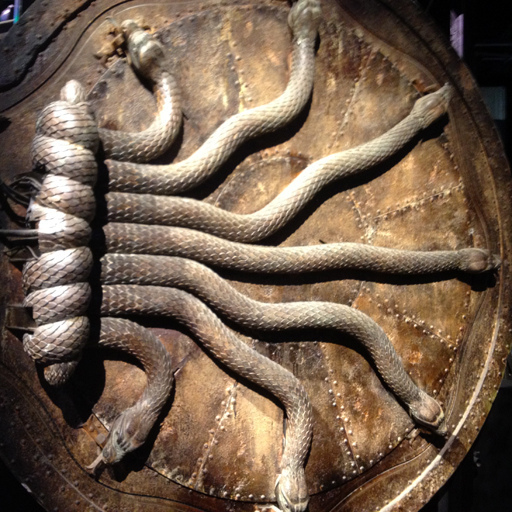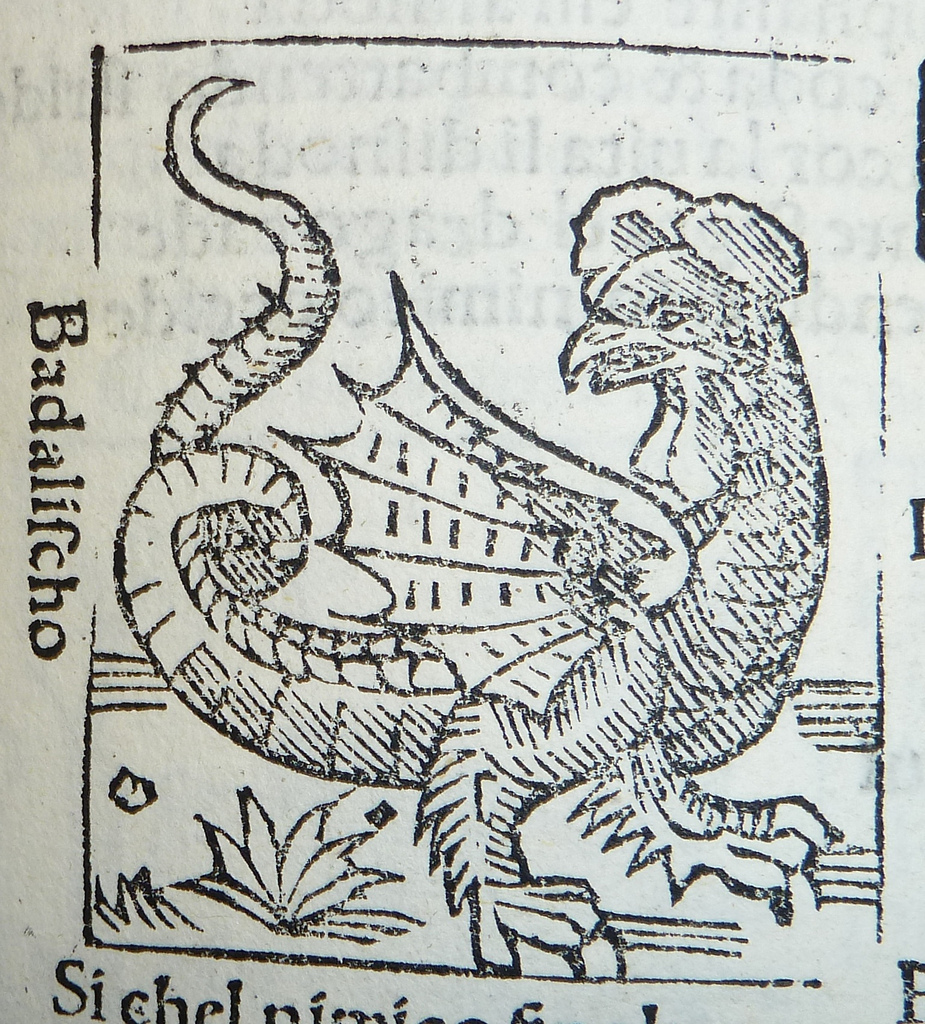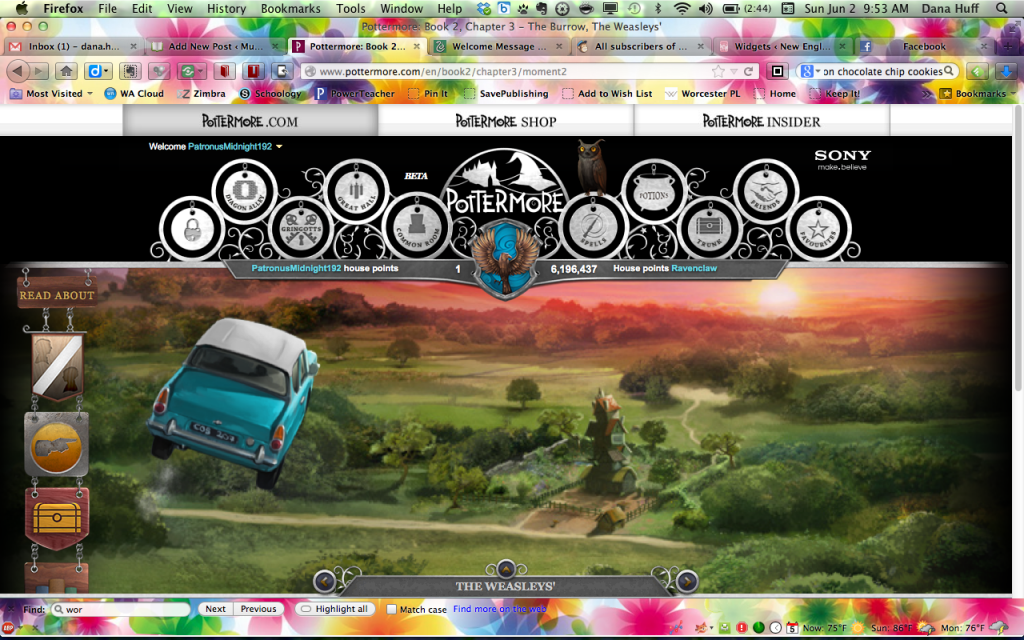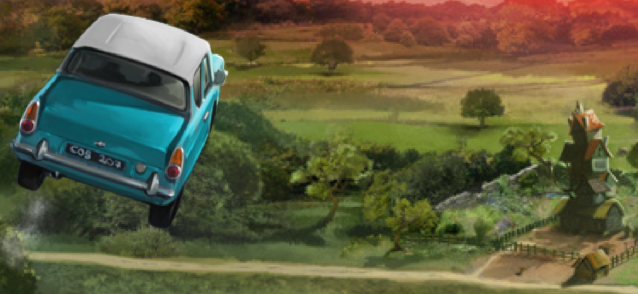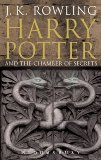
I went ahead and finished the rest of [amazon_link id=”0439064872″ target=”_blank” ]Harry Potter and the Chamber of Secrets[/amazon_link], so this post will cover chapters 11-18. I didn’t stop after chapter 15 this time. The end of that book is serious! You want to keep reading, you know?
Chapter 11, “The Duelling Club,” is the chapter in which Harry learns the most important spell he will ever learn, at least in terms of defeating Voldemort: “Expelliarmus.” And he learns it from Snape. If you read very carefully, you will notice that it is Snape who teaches Harry pretty much everything he really needs to know in order to defeat Voldemort. In many ways, Harry learns more from Snape than he does any other teacher. I always thought it was interesting that Harry’s signature charm involved disarming—simply taking away an attacking wizard’s power in order to prevent violence. It’s an incredibly effective charm. Because Snape is a bully in the classroom, however, it is very hard for his students to learn from him. They’re afraid of him. What an effective teacher he might have been had he not been so nasty! He is still my favorite character.
We also learn in that chapter that Harry’s ability to talk to snakes is rare and is a sign of being a Dark Wizard. Herpo the Foul, an ancient Greek wizard who probably invented the horcrux and hatched the first basilisk, was also a Parselmouth. No wonder Parselmouths have such a bad rep. Also, since I’m thinking about it, I need to take a minute to make a correction. I’ve seen a quote attributed to J.K. Rowling going around the Internet, mostly on Pinterest via Tumblr, in which she purportedly says that Nagini was that boa constrictor that Harry set free at the zoo on Dudley’s birthday. Not true. Nagini was not a boa constrictor. Actually, her species is never named. However, she was made a horcrux in Albania after Voldemort killed Bertha Jorkins. This rumor has apparently caused such a kerfuffle on the Harry Potter Wiki that the Nagini page has been locked.
Another thing you notice when you read the books is that Harry is a lot funnier and snarkier in the books than in the movies. When Lockhart is trying to coach Harry—”Just do what I did, Harry!”—in the duel with Malfoy, Harry responds, “What, drop my wand?” Snicker.
You do have to wonder why Snape tells Malfoy to cast Serpensortia in the duel. I mean, did he realize Harry was a Parselmouth? Did he hope to out Harry’s ability to speak to snakes? Or was it just a Slytherin thing, and I wouldn’t understand? I do like how the scene plays out, though—Harry doesn’t understand why, but he just yells at the snake to leave Justin alone. I love how Rowling shows us here that a sort of innocent scene in the first book, a case of accidental magic when Harry finds himself talking to a snake, turns out to be much more sinister than we suspected. And interestingly enough, it is the first magic we see Harry perform.
Of course, all of this prompts Harry’s crisis. He starts dwelling on what the Sorting Hat said about his being a good candidate for Slytherin. Also, it’s in this scene, I think, that we first hear the “nasty little voice” in Harry’s head—”Ah… But the Sorting Hat wanted to put you in Slytherin, don’t you remember?” He will hear this voice again. Is it Voldemort’s horcrux, talking to him? I know we all have that voice inside our heads that puts us down, makes us pay more attention to the negative instead of the positive. Still, you have to wonder if in Harry’s case, it’s a little more than that.
Then the whole school is buzzing that Harry is the Heir of Slytherin, and Harry overhears the Hufflepuffs talking about how he must have defeated Voldemort because he’s an even more powerful Dark Wizard. Interesting to note: you might recall Hufflepuff has produced fewer Dark Wizards than any other house. They get along with most folks well, but it stands to reason the mere fact that someone is in Gryffindor wouldn’t preclude the possibility that that someone is also evil. And then, right after this confrontation with the Hufflepuffs, Harry finds Justin Finch-Fletchley petrified in the hallway. He is going to have some ‘splainin’ to do.
In chapter 12, “The Polyjuice Potion,” Harry is taken off to Dumbledore’s office, a very cool place with a “decrepit-looking bird which resembled a half-plucked turkey.” Harry looks at the bird and “was just thinking all he needed was for Dumbledore’s pet bird to die while he was alone in the office with it, when the bird burst into flames.” OK, that is dark, for sure, but it’s funny. And in a tidy piece of exposition, we learn that the bird in question is a phoenix—they can carry heavy loads, their tears have healing powers, and they are highly faithful pets. All of which makes Fawkes the perfect deus ex machina. As a matter of fact, when I teach that literary device in my English classes, Fawkes is my example. As Dumbledore questions Harry about whether there is anything else Harry wants to tell him, and Harry doesn’t feel like he should share what he knows, once again, the description makes it appear as though Dumbledore is using legilimency on Harry. Harry is so frustrating in these early books in his refusal to seek help from people.
Another joke later in this chapter—George makes a crack that Harry is “nipping off to the Chamber of Secrets for a cup of tea with his fanged servant.” And, actually, it is fanged.
Of course, this is the chapter in which the trio takes Polyjuice Potion. This potion completely transforms in the books—even the voice. For some reason, possibly clarity—the movies chose to portray characters who have taken Polyjuice Potion with their natural voices. Question: how would this potion affect Muggles? Would it work? We know that love potions work on Muggles because Merope Gaunt successfully used one on Tom Riddle. But what about a Polyjuice Potion? What do you think? I have a hunch that it wouldn’t work on a Muggle, even if a Muggle could get access to some. Pottermore has some interesting things to say about Polyjuice Potion: “The idea that a witch or wizard might make evil use of parts of the body is an ancient one, and exists in the folklore and superstitions of many cultures.” That is true. Think of the witches’ spell in Macbeth. Pottermore adds, “The fact that Hermione is able to make a competent Polyjuice Potion at the age of twelve is testimony to her outstanding magical ability, because it is a potion that many adult witches and wizards fear to attempt.” True, true. J.K. Rowling shares some interesting insights into the potion on Pottermore as well:
I remember creating the full list of ingredients for the Polyjuice Potion. Each one was carefully selected. Lacewing flies (the first part of the name suggested an intertwining or binding together of two identities); leeches (to suck the essence out of one and into the other); horn of a Bicorn (the idea of duality); knotgrass (another hint of being tied to another person); fluxweed (the mutability of the body as it changed into another) and Boomslang skin (a shedded outer body and a new inner).
Also kind of interesting to note: when Harry and Ron (as Crabbe and Goyle) run into Percy, Percy says that because he is a Prefect, “Nothing is about to attack me.” Of course, that’s ridiculous, as Penelope Clearwater later is attacked, but where does he get that idea that Prefects are somehow that special? Tells you a lot about Percy rather early on, doesn’t it?
Harry and Ron learn from Malfoy that Ron’s father was fined over the enchanted Ford Anglia. But Malfoy says something rather interesting: “You know, I’m surprised the Daily Prophet hasn’t reported all these attacks yet.” Yeah. Me too. Why do they keep it quiet? Because of Fudge? I know Malfoy blames Dumbledore for that, but Dumbledore is a little more on the up-and-up than that. He has learned his lessons about secrecy (unless it is necessary). Malfoy also makes a comment that “A decent Headmaster would never’ve let slime like that Creevey in.” Which makes me wonder—have other Headmasters actively blocked the admittance of Muggle-born witches and wizards? Did Phineas Nigellus? Or was that kind of thing more or less outside their control, as long as a child showed magical ability? Hmm.
The last bit of interesting news Harry and Ron learn is that the Chamber of Secrets was opened 50 years ago, and a student died. In the next chapter, “The Very Secret Diary,” Harry and Ron find Tom Riddle’s old diary in Moaning Myrtle’s bathroom. Interesting note about Ron here. His first compulsion regarding the diary:
Harry stepped forward to pick it up, but Ron suddenly flung out an arm to hold him back.
“What?” said Harry?
“Are you mad?” said Ron. “It could be dangerous.”
Ron is not given to cautiousness as a general rule. But his first response to seeing the diary is to be careful and not to touch it. And he’s right. Ron is given the short shrift in the movies. He is a lot more intuitive than the movies make him out to be. He has good instincts. He also makes a joke about why T.M. Riddle received his special award for services to the school: “Maybe he murdered Myrtle, that would have done everyone a favor.” Yikes. That is exactly what he did. See what I mean? Good instincts. You will often find that when Ron is making a joke, he’s actually dead-on accurate. It’s a little spooky.
Ron tries to convince Harry to get rid of the diary, but “Harry couldn’t explain, even to himself, why he didn’t just throw Riddle’s diary away. The fact was that even though he knew the diary was blank, he kept absent-mindedly picking it up and turning the pages, as though it was a story he wanted to finish.” I think it’s the horcrux connection. He senses some sort of connection between himself and the book, and that is why he can’t bring himself to just toss it.
Oh. My. Gosh. That Valentine’s Day scene in the book is priceless. It’s too bad it was cut from the films. I love it. But when ink spills all over the diary, Harry gets a hunch and tries writing in it, which is how he discovers the diary talks back. And it tells Harry that “The monster [in the Chamber of Secrets] lived on, and the one who had the power to release it was not imprisoned.” Well, that is too true, isn’t it? The way Harry is pitched into the past through the diary reminds me very much of the Pensieve. In fact, because it is also Tom Riddle’s memory, in addition to a piece of his soul, it probably works much the same as the Pensieve.
Harry begins noticing odd similarities between Tom Riddle and himself—something that Riddle will also point out later on.
In chapter 14, “Cornelius Fudge,” the diary is stolen from Harry, and Hermione figures out that the monster in the chamber is a basilisk and goes to the library to confirm her hunch. She is petrified right afterward. Harry and Ron sneak out to talk to Hagrid using Harry’s cloak, and they learn that Dumbledore is suspended. Right before he leaves, he says, somehow knowing Harry and Ron are in Hagrid’s hut, that “help will always be given at Hogwarts to those who ask for it.”
In chapter 15, “Aragog,” Harry and Ron follow Hagrid’s suggestion to “follow the spiders.” Yech! Is that a horrific scene or what? The one thing that Harry dwells on after they escape from the acromantulas is that even they are afraid of the monster in the Chamber of Secrets: “The creature that was lurking somewhere in the castle, he thought, sounded like a sort of monster Voldemort—even other monsters didn’t want to name it.” The twinning of the basilisk with Voldemort is obvious to the reader here, but it doesn’t occur to Harry that the Heir of Slytherin could be Voldemort because he believes Voldemort to be roaming, bodiless and unable to inflict harm.
In chapter 16, “The Chamber of Secrets,” the boys find the piece of paper crumpled in Hermione’s hand and realize the monster is a basilisk, and finally Harry understands why he alone seems to hear the monster. Everything else comes together as they realize the student who died 50 years ago was, indeed, Moaning Myrtle. And then Ginny is taken into the Chamber.
How crazy are those two for thinking they can fight off a basilisk? Why don’t they ever tell anyone anything? Well, they do decide, for some crazy reason, to tell Lockhart, of all people. And they learn he’s a great big fraud, which they already suspected. But they manage to disarm him and force him to accompany him to the Chamber of Secrets.
On Pottermore, we learn that the other three founders had no idea about Slytherin’s Chamber of Secrets, and none of them created “grandiose statues” of themselves. He is also the only one of the founders to create his own room for the express purpose of keeping everyone but a select few out: “Perhaps, when he first constructed the Chamber, Slytherin wanted no more than a place in which to instruct his students in spells of which the other three founders may have disapproved (disagreements sprung up early around the teaching of the Dark Arts).”
Also, this is interesting:
There is clear evidence that the Chamber was opened more than once between the death of Slytherin and the entrance of Tom Riddle in the twentieth century. When first created, the Chamber was accessed through a concealed trapdoor and a series of magical tunnels. However, when Hogwarts’ plumbing became more elaborate in the eighteenth century (this was a rare instance of wizards copying Muggles, because hitherto they simply relieved themselves wherever they stood, and vanished the evidence), the entrance to the Chamber was threatened, being located on the site of a proposed bathroom. The presence in school at the time of a student called Corvinus Gaunt—direct descendant of Slytherin, and antecedent of Tom Riddle—explains how the simple trapdoor was secretly protected, so that those who knew how could still access the entrance to the Chamber even after newfangled plumbing had been placed on top of it.
Whispers that a monster lived in the depths of the castle were also prevalent for centuries. Again, this is because those who could hear and speak to it were not always as discreet as they might have been: the Gaunt family could not resist boasting of their knowledge. As nobody else could hear the creature sliding beneath floorboards or, latterly, through the plumbing, they did not have many believers, and none, until Riddle, dared unleash the monster on the castle.
Successive headmasters and mistresses, not to mention a number of historians, searched the castle thoroughly many times over the centuries, each time concluding that the chamber was a myth. The reason for their failure was simple: none of them was a Parselmouth.
In chapter 17, “The Heir of Slytherin,” Harry comes face to face with Voldemort again, this time as the 16-year-old memory/horcrux preserved in the diary. Question: Can a wizard regenerate from a horcrux alone? How does that work? Does it just keep a wizard from dying, or is there a way to create a new body from one? Inquiring minds want to know!
Another thing I want to know is why Harry stupidly flings his wand aside. It’s not like he needed to drop it to free his hands. What the heck was he thinking?
Another weird thing: Riddle accuses Hagrid of raising werewolf cubs under his bed. That’s impossible. Werewolves are people who transform at the full moon into wolves. They do have have cubs. They have children. Sometimes I think Voldemort is stupid. He’s supposed to be very clever, but for someone who is supposed to be clever, he sure forgets a lot of obvious, important things.
He tells Harry that his father abandoned his mother when he found out she was a witch. Sadly, we learn what really happened was she stopped feeding him love potion. I do feel sorry for Merope Gaunt.
Riddle tells Harry there are “strange likenesses between us, Harry Potter.”
- Both half-bloods. Well, Harry isn’t really. His mother was Muggle-born, but not a Muggle. Tom Riddle’s father was an actual Muggle.
- Both orphans. Well, the fact that Harry is an orphan is Riddle’s own fault.
- Both raised by Muggles.
- Probably the only two Parselmouths to come to Hogwarts since Slytherin. Nope, as we learned on Pottermore, the descendants of Slytherin between Slytherin and Tom Riddle could speak to snakes, too.
- “We even look something alike.”
Creepy. And all of this has to do with the notion that they are essentially two sides of the same coin. They have many of the same problems and opportunities in life, but it is what they each choose to do with that life that makes them different. Voldemort is Harry’s shadow, and I’m not the first person to come up with that theory. Here is another interesting essay about that theory.
Just as things look bleakest for Harry the deus ex machina Fawkes shows up with the Sorting Hat, which is packing the Sword of Gryffindor. Harry uses the sword to kill the basilisk after Fawkes blinds it, rendering it a little less deadly (at least it can no longer murder Harry with its stare; the fangs are still a problem). Isn’t it weird how it just occurs to Harry somehow that he should stab the diary with a basilisk fang? I mean, what prompted that? Would you have thought to do that? I wouldn’t have. And I’d have died right there in the Chamber of Secrets.
In the final chapter, “Dobby’s Reward,” Dumbledore makes an interesting comment about Voldemort:
Very few people know that Voldemort was once called Tom Riddle. I taught him myself, fifty years ago, at Hogwarts. He disappeared after leaving the school… traveled far and wide… sank so deeply into the Dark Arts, consorted with the very worst of our kind, underwent so many dangerous, magical transformations, that when he resurfaced as Lord Voldemort, he was barely recognizable. Hardly anyone connected Lord Voldemort with the clever, handsome boy who was once Head Boy here.
We later learn that it was the process of making horcruxes that twisted Voldemort’s appearance. He was able to obliterate his past, and it always seems to be those wizards whom he has most cause to fear that remind him he was once Tom Riddle and call him by name: Dumbledore and Harry.
If you were wondering at all about the genesis of the argument over Gryffindor’s sword—did Godric Gryffindor steal it from the goblins? Or did they lie about it? Here’s the truth from Pottermore:
The sword was made to Godric Gryffindor’s specifications by Ragnuk the First, finest of the goblin silversmiths, and therefore King (in goblin culture, the ruler does not work less than the others, but more skillfully). When it was finished, Ragnuk coveted it so much that he pretended that Gryffindor had stolen it from him, and sent minions to steal it back. Gryffindor defended himself with his wand, but did not kill his attackers. Instead he sent them back to their king bewitched, to deliver the threat that if he ever tried to steal from Gryffindor again, Gryffindor would unsheathe the sword against them all.
The goblin king took the threat seriously and left Gryffindor in possession of his rightful property, but remained resentful until he died. This was the foundation for the false legend of Gryffindor’s theft that persists, in some sections of the goblin community, to this day.
Just so you know for later, Griphook was in the wrong.
Dumbledore also shares something very important with Harry. If you were an astute reader, you probably remembered it when you learned about horcruxes in [amazon_link id=”0439785960″ target=”_blank” ]Half-Blood Prince[/amazon_link]:
Unless I’m much mistaken, he transferred some of his own powers to you the night he gave you that scar. Not something he intended to do, I’m sure…”
And you said, OMG! Harry’s a horcrux!
But Dumbledore also said, “It is our choices, Harry, that show what we truly are, far more than our abilities.” And that is what makes Harry different from Voldemort.
Case in point? Harry is moved to free Dobby from the Malfoy family. Voldemort didn’t care about house elves. To his detriment, later, when he harmed Kreacher and thereby lost the service of Regulus Black.
On the train ride back, Harry and his friends “practiced disarming each other by magic. Harry was getting very good at it.” See, I think Rowling is clever to insert that little sentence because if you are good enough at defending yourself, you don’t need to attack. And it is through defending himself that he will ultimately defeat Voldemort, turning Voldemort’s evil back onto himself and making him responsible for his own destruction.
Whew. These are really long essays. I need to condense.
